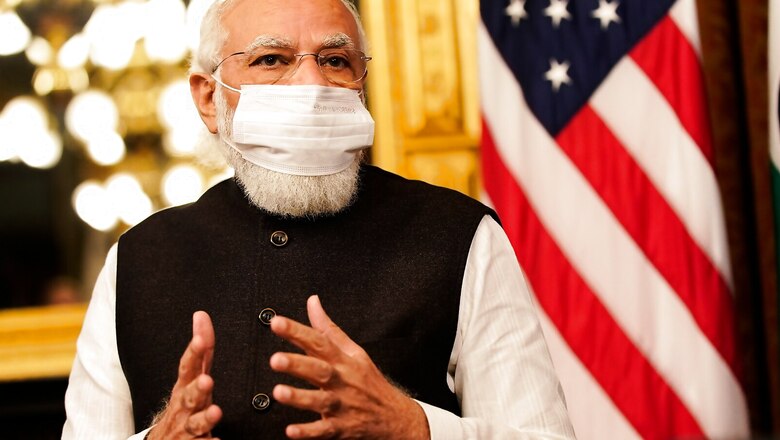
views
At an event in Washington DC last month, External Affairs Minister S Jaishankar engaged with the Indian-American diaspora in a Q&A session. One of his viral comments took aim at biased coverage of India in the US media. Without mentioning The New York Times or The Washington Post, Jaishankar pointed out the condemnation and head-shaking that emanates from both outlets when it comes to news about Prime Minister Narendra Modi, or India.
Although some of the criticism aimed at India might be fair, the overarching image presented for the readers of both papers is that India under Modi is one election away from turning into Nazi Germany.
Since Modi’s election in 2014, it’s no secret that the Western media has never been shy of expressing dismay at the direction India’s politics have taken. In 2019 Indians disappointed New York and DC journalists once more by voting in Modi for a second term. One would assume that the story of a lower-caste Hindu defeating the blue-blooded scion of the party that ruled India for decades would thrill western journalists.
But the media’s ideological alignments, and collusion with the Indian left has blinded them to any positive developments in India. Their coverage of India consists of anti-Modi, anti-BJP personalities exercising political grievances, litigating them through a Western ideological lens (Modi is Trump, BJP is the GOP), and lending credibility to people who wish nothing more than to bring India down.
Having been shut out of the doors of power, India’s resident and non-resident elite have employed their connections in the West to reshape India’s image through the corporate media. Academics, media intermediaries, and a cavalcade of what I refer to as “brown sahibs” have made their careers on interpreting the “New India” for a largely white liberal audience, who can gasp in horror at another uncivilised brown nation.
Think-tank experts and columnists express dismay at India’s domestic politics, wondering whether the US can partner in good faith with a country where press freedoms and democracy are being eroded by majoritarian politics. One wonders where these think-tank experts have been over the past 70 years as the US partnered with Pakistan, Saudi, the Philippines, and even China during the Cold War to further its foreign policy goals, and why they think India must be held to an impossible standard when it comes to foreign policy.
The democratisation of news combined with the rise of social media has led to a fractured, fact-free ecosystem. Corporate media are no longer viewed as truth seekers, but as activists with bylines at their worst, and gatekeepers of information at best. Journalism and journalists are already held in low regard by most Americans, perhaps even lower than elected politicians.
Whether the corporate press accepts it or not, its reporting, and opinion journalism are viewed as arms of the American state by non-Americans. Despite the mythologising of American journalists in popular culture as independent heroes in search of the truth, the reality is the American press has a history of colluding with the technocratic and administrative elite who reside in Washington DC to further its own agenda.
Today, the American corporate press serves what can be called “vested interests”. They can be relied upon to leak highly classified information when it hurts their targets, and to act much like the blind King Dhritarashtra when that information would hurt their political allies in the Democrat Party. It is in this context that Dr Jaishankar’s remarks must be understood.
Projecting confidence requires standing on one’s own merits, rather than engaging in comparisons to others. Much like individuals, nations that hope to prosper and survive must engage in their own affairs without worrying what others might say. A civilisational state like India requires such a leader. Modi rarely gives interviews, and when he does he prefers social media to the corporate press. He refuses to speak in English, despite being fluent in the language. He celebrates Hindu festivals, visits Hindu temples, and engages with Hindu communities when he goes abroad. In other words, he acts like the elected leader of a nation of 1.3 billion people, and not as supplicant to Western interests.
In the run-up to the 2014 and 2019 elections, Modi bypassed the press by using the power of social media to take his case straight to the voting public. Jaishankar’s exhortation to the diaspora is an extension of that strategy. The Times and the Post have the power to shape India’s perception in the West because so far there has been no competition.
As in the days of the freedom struggle, the Indian diaspora must be active in support for the motherland at home and abroad. We don’t need more eminent journalists, we need citizen journalists engaging with the diaspora and with the wider public in America, Canada, and the UK. We need community leaders engaging on civic and cultural issues rather than leading cloistered communities that come together only for religious occasions. Like other countries, India needs a cultural and media outlet based in Washington DC to project its image to the centre of American power.
To challenge the anti-India narrative, diaspora Indians need to step up and stand up. The inferiority complex has to go, along with the modern-day victimhood narrative many Left-leaning Indians engage in. We need to move beyond the superficiality of immigrant culture, the fruitless and banal discussions around chai, butter chicken, or Bollywood. Let’s be done with keeping up with the Joneses contests, wondering whose son got into Harvard or whose daughter received equity at Google.
Well-off Indians would do better to donate to a political action committee that stands up for their community instead of donating to their well-endowed alma maters, or some NGO in exchange for crumbs from the white liberal boardroom table. No matter what you do, show some outward pride in your culture, in your religion, in your name, in your own rich and diverse history. That perhaps would be a good beginning to start changing India’s image.
Anang Mittal (@anangbhai) is a public affairs professional living and working in Washington DC. He was previously an outreach manager at Google, and a staffer for Senate Majority Leader Mitch McConnell. He is a first generation immigrant from New Delhi, India. Views expressed are personal.
Read all the Latest Opinions here



















Comments
0 comment